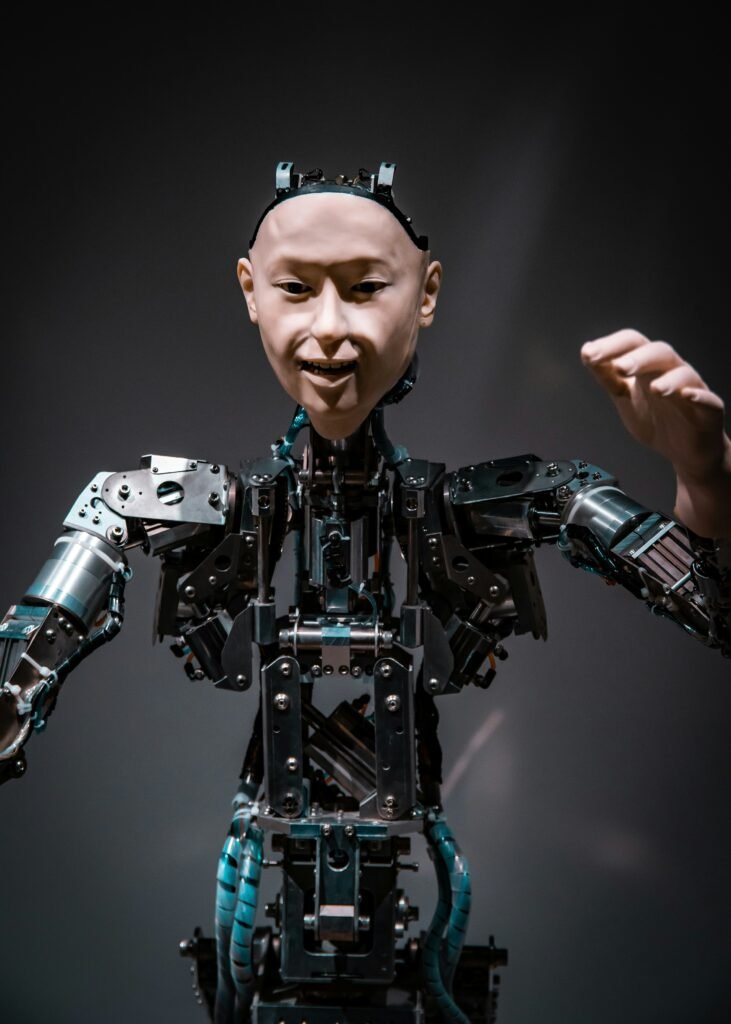In a recent episode of the “Curious Conversations” podcast, Sarah Hendrickson Parker discussed the potential for artificial intelligence (AI) in healthcare. As the Chair of Health Systems and Implementation Science at Virginia Tech Carilion School of Medicine, Parker highlighted the current use of AI and machine learning in healthcare and discussed their future applications. She emphasized the important role of technology as a teammate to healthcare workers and discussed the challenges of implementing AI effectively. From cybersecurity concerns to employee training, the conversation shed light on the exciting possibilities and obstacles of integrating AI into the healthcare industry.
The Potential for Artificial Intelligence in Health Care: Curious Conversations with Sarah Hendrickson Parker
Artificial Intelligence (AI) technology has the potential to revolutionize the field of health care. In a recent episode of the “Curious Conversations” podcast, Sarah Hendrickson Parker, chair of health systems and implementation science at Virginia Tech Carilion School of Medicine, and associate professor at the Fralin Biomedical Research Institute at VTC, spoke about the current advancements in AI technology and its potential applications in health care.
Advancements in AI Technology in Health Care
Machine Learning Algorithms
One of the key advancements in AI technology is the development of machine learning algorithms. These algorithms can analyze vast amounts of medical data and identify patterns and trends that human doctors may miss. By identifying these patterns, AI can assist in diagnosing diseases and predicting patient outcomes with a higher degree of accuracy.
Natural Language Processing
Natural Language Processing (NLP) is another advancement in AI that can have a significant impact on health care. NLP allows machines to understand and interpret human language, enabling them to analyze medical literature, patient records, and other healthcare data. This can help streamline the process of data analysis and improve the accuracy of diagnoses.
Computer Vision
Computer Vision is a branch of AI that focuses on enabling machines to process and interpret visual information. In health care, computer vision can be used to analyze medical images such as X-rays, CT scans, and MRIs. By using computer vision algorithms, AI can assist in the early detection of diseases and improve the accuracy of image-based diagnosis.
Robotics in Surgery
AI-driven robotics are already being used in surgical procedures, making surgeries safer and more precise. These robots can assist surgeons in delicate procedures, such as minimally invasive surgery, by enhancing the surgeon’s dexterity and reducing the risk of human error. AI-powered robots can also analyze real-time data during surgery, providing surgeons with valuable insights and recommendations.
Predictive Analytics
AI’s ability to analyze large amounts of data and detect patterns can be particularly valuable in predictive analytics. By analyzing electronic health records and other patient data, AI can help predict patient outcomes, identify individuals at risk for certain diseases, and recommend personalized treatment plans. This can ultimately lead to more targeted and efficient healthcare interventions.
Current Use of AI in Health Care
Diagnostic Medicine
AI has already made significant contributions to diagnostic medicine. By analyzing medical data, AI algorithms can aid in the accurate and timely diagnosis of various diseases, including cancer, cardiovascular diseases, and neurological disorders. AI can help identify patterns and biomarkers that are indicative of specific diseases, assisting doctors in making informed diagnoses.
Personalized Medicine
Personalized medicine aims to provide tailored treatment plans based on an individual’s unique genetic makeup, lifestyle, and medical history. AI can play a crucial role in personalized medicine by analyzing large amounts of patient data to identify patterns and trends. By leveraging AI technologies, doctors can develop more effective and targeted treatment regimens for individual patients.
Drug Discovery and Development
The process of drug discovery and development is complex and time-consuming. AI can assist in accelerating this process by analyzing vast amounts of medical literature, genetic data, and clinical trial results. AI algorithms can help researchers identify potential drug targets, predict the efficacy of drug candidates, and optimize drug formulations. This can lead to more efficient drug development and faster delivery of life-saving medications to patients.
Remote Patient Monitoring
Remote patient monitoring is an emerging field that allows healthcare providers to remotely monitor patients’ health status and provide timely interventions. AI technologies can analyze real-time patient data, such as vital signs and symptom reports, and alert medical professionals to any abnormalities or changes. This can enable earlier interventions and prevent costly hospitalizations.
Healthcare Robotics
Robots equipped with AI capabilities are already being used in healthcare settings. These robots can perform a variety of tasks, such as cleaning and disinfection, medication delivery, and patient interaction. AI-powered robots can also assist in physical therapy and rehabilitation by providing personalized exercise programs and monitoring progress. In the future, healthcare robots may take on more complex roles such as assisting with surgeries and providing basic medical care.

Challenges in Implementing AI in Health Care
While the potential of AI in health care is promising, there are several challenges that need to be addressed for successful implementation.
Cybersecurity
As health care systems increasingly rely on AI and connected devices, the risk of cybersecurity breaches and data breaches becomes more significant. Protecting patient data and ensuring the security and privacy of sensitive medical information is paramount. Health care organizations need to invest in robust cybersecurity measures to safeguard patient data from unauthorized access.
Operating System Compatibility
Integrating AI systems into existing health care infrastructure can be challenging due to compatibility issues with different operating systems and electronic medical record (EMR) platforms. Efforts need to be made to ensure that AI systems can seamlessly integrate with existing systems, allowing for smooth data exchange and interoperability.
Employee Training
Training health care professionals to effectively use AI technologies is crucial for successful implementation. Doctors, nurses, and other medical staff need to be trained on how to interpret and utilize the insights provided by AI systems. Additionally, they need to be educated on the ethical considerations and limitations of AI in order to make informed decisions and provide the best possible care to patients.
Shifting Job Duties
The implementation of AI in health care may lead to a shift in job duties for medical professionals. Some tasks that were traditionally performed by humans, such as data analysis and administrative work, can now be automated by AI systems. Health care organizations need to carefully evaluate the impact of AI on job roles and provide appropriate training and support for professionals whose duties may change as a result of AI implementation.
Benefits of AI in Health Care
Improved Diagnosis and Treatment
AI systems have the potential to greatly improve the accuracy and efficiency of disease diagnosis. By analyzing large amounts of patient data, including medical images, lab results, and medical records, AI algorithms can help physicians make more accurate and timely diagnoses. This can result in earlier intervention and more effective treatment plans, ultimately leading to improved patient outcomes.
Efficiency and Productivity
AI can automate time-consuming and mundane tasks, allowing health care professionals to focus on delivering high-quality patient care. AI-powered systems can streamline administrative tasks, such as appointment scheduling and billing, freeing up valuable time for medical professionals to spend with patients. This increased efficiency and productivity can lead to better patient experiences and improved overall healthcare delivery.
Cost Reduction
By optimizing workflows and automating certain tasks, AI has the potential to reduce healthcare costs. For example, AI can help identify areas where unnecessary tests or treatments are being performed, leading to more cost-effective care. Additionally, AI systems can assist in predicting and preventing hospital readmissions, which can significantly reduce healthcare expenditures.
Enhanced Patient Engagement
AI technologies, such as virtual assistants and chatbots, can enhance patient engagement and improve patient experiences. These technologies can provide patients with personalized health information, answer common health-related questions, and offer guidance on self-care and self-management. By empowering patients with knowledge and resources, AI can enable individuals to take an active role in their own health and well-being.

Cybersecurity and Data Privacy Concerns
The increasing use of AI in health care also raises concerns about cybersecurity and data privacy.
Protecting Patient Data
As health care organizations collect and analyze larger amounts of data, protecting patient information becomes a top priority. AI systems must be designed with robust security measures to prevent unauthorized access and protect patient privacy. This includes encryption of sensitive data, secure storage and transmission methods, and regular security audits.
Preventing Data Breaches
Data breaches can have serious consequences in health care, including the exposure of sensitive patient information and potential harm to patients. AI systems must be regularly tested and updated to identify vulnerabilities and prevent cyberattacks. Health care organizations should also establish comprehensive incident response plans to minimize the impact of a potential data breach.
Complying with Privacy Regulations
Health care organizations must ensure that their use of AI technologies complies with relevant privacy regulations, such as the Health Insurance Portability and Accountability Act (HIPAA) in the United States. This includes obtaining patient consent for data collection and use, implementing privacy controls, and providing patients with transparency and control over their personal health information.
AI and Electronic Medical Records
Integrating AI into electronic medical records (EMRs) can improve the efficiency and accuracy of health care workflows.
Optimizing EMR Workflow
AI can streamline the process of documenting patient encounters by automatically populating EMR fields with relevant data. This can reduce the burden of manual data entry for healthcare professionals and help streamline documentation processes.
Automated Charting
AI algorithms can analyze patient data and generate accurate and comprehensive clinical notes, reducing the time and effort required for medical professionals to document patient encounters. This can improve the accuracy and completeness of medical records, leading to better continuity of care.
Clinical Decision Support Systems
AI can be used to develop clinical decision support systems (CDSS) that can assist healthcare professionals in making evidence-based treatment decisions. CDSS can analyze patient data, medical literature, and clinical guidelines to provide recommendations and alerts for optimal patient care. This can help reduce errors and improve clinical outcomes.

Training Medical Professionals to Use AI
To effectively utilize AI in health care, medical professionals need proper training and education.
Integrating AI into Medical Education
AI should be integrated into medical school curricula to ensure that future healthcare professionals are equipped with the necessary skills and knowledge to utilize AI technologies. This includes training on how to interpret AI-generated insights, understanding AI’s limitations and ethical considerations, and assessing the quality and validity of AI-generated recommendations.
Collaboration between AI Experts and Clinicians
Collaboration between AI experts and healthcare professionals is crucial for the successful implementation of AI in health care. By working together, AI experts can better understand the needs and challenges of healthcare professionals, and healthcare professionals can provide valuable insights to improve AI algorithms and technologies.
Ethical and Legal Training
Medical professionals need to be trained on the ethical and legal considerations surrounding the use of AI in health care. This includes understanding issues such as data privacy, bias in AI algorithms, and accountability in AI decision-making. By having a strong ethical foundation, healthcare professionals can ensure that AI is used responsibly and in the best interest of patients.
The Role of AI in Patient Care
AI can play a crucial role in enhancing patient care and improving patient outcomes.
Early Disease Detection
By analyzing patient data and medical images, AI algorithms can help identify early signs of diseases that may go unnoticed by human doctors. This early detection can lead to earlier intervention and more successful treatment outcomes.
Personalized Treatment Plans
AI can analyze massive amounts of patient data to develop personalized treatment plans. By taking into account an individual’s genetic information, medical history, and lifestyle factors, AI can recommend treatment regimens that are tailored to the specific needs of each patient.
Improving Patient Outcomes
Through its ability to process and analyze large amounts of data, AI can assist healthcare professionals in making more informed treatment decisions. This can lead to more effective interventions, better treatment outcomes, and improved patient satisfaction.
Virtual Assistants and Chatbots
Virtual assistants and chatbots powered by AI can provide patients with personalized health information, answer common health-related questions, and offer support for self-care and self-management. These tools can enhance patient engagement and empower individuals to take an active role in their own health.
Future Possibilities of AI in Health Care
The future of AI in health care holds exciting possibilities for further advancements and innovations.
Precision Medicine
AI has the potential to revolutionize precision medicine by providing healthcare professionals with more accurate and targeted treatment recommendations. By analyzing vast amounts of patient data, including genetic information, AI can identify specific genetic markers and biomarkers that are linked to certain diseases. This can enable the development of tailored treatment plans that address each patient’s unique needs.
Telemedicine
Telemedicine has gained significant popularity in recent years, and AI can further enhance its capabilities. AI-powered virtual assistants can conduct initial patient assessments, provide triage assistance, and guide patients through self-care protocols. This can improve access to healthcare services and reduce the burden on healthcare providers.
Robotic Surgery
AI-driven robotics have already made significant contributions to surgical procedures, but the potential for further advancements is vast. AI-powered robots can become increasingly autonomous and assist surgeons in performing complex surgeries with greater precision and accuracy. This can lead to shorter recovery times, reduced complications, and improved patient outcomes.
In conclusion, AI has the potential to revolutionize the field of health care by improving diagnosis and treatment, increasing efficiency and productivity, reducing costs, and enhancing patient engagement. However, successful implementation and adoption of AI in health care require addressing challenges such as cybersecurity and data privacy concerns, operating system compatibility, and ensuring proper training for medical professionals. By leveraging the benefits of AI and addressing these challenges, the future of health care can be transformed for the better.






